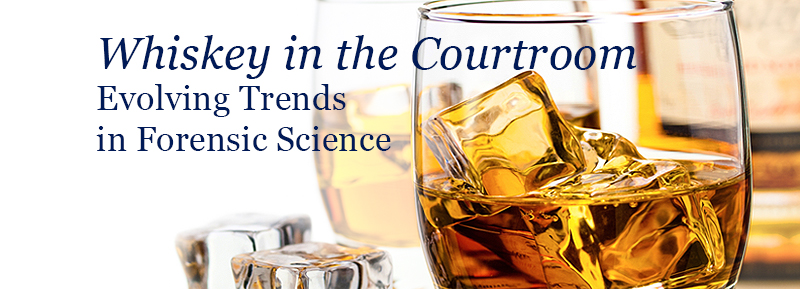2016 Symposium: Whiskey in the Courtroom

When: March 4, 2016
Location: Durham County Courthouse; 9th Floor Conference Room
Approved for 5.5 hours of NC CLE credit
Registration is now closed
Symposium Co-sponsors


The target audience for this program is criminal defense attorneys who handle cases involving forensic science evidence. This program aims to instruct attorneys about various types of forensic science evidence and the legal issues related to expert testimony, discovery, and admissibility of forensic evidence. It is essential for criminal defense attorneys to be able to understand complex scientific evidence and be able to litigate issues related to this type of evidence
Tentative Agenda
The following agenda is subject to change.
8:30 - 9:00 am Registration and Posters
9:00 - 10:20 am Session 1: Cognitive Bias
- J.H. Pate Skene, Ph.D. JD, Associate Research Professor of Neurobiology
- Artemis Malekpour, J.D., M.H.A., Trial Consultant, Malekpour & Ball
Every day, cognitive biases (known and unknown to us) help us make sense of the confusing mass of information we encounter. These biases act as “shortcuts” to sort information, identify threats, welcome friends, and otherwise assist us in making decisions and guiding our choices. The same biases affect the various actors in the criminal justice system, including law enforcement, lab analysts, prosecutors, defense lawyers, judges, and jurors. Speakers will present a primer on how cognitive biases operate and impact decision makers in the criminal justice system, with particular emphasis on jurors.
10:20-10:35 am Break
10:35-11:55 am Session 2: Responding to Questionable Science
This session will address how attorneys should challenge questionable scientific analysis of forensic evidence in criminal cases.
- Andrew DeSimone, JD, Assistant Appellate Defender, Office of the Appellate Defender
Mr. DeSimone will advise how to use lab protocols to limit the testimony of analysts to what is scientifically supportable. He will also address motions practice and the use of jury instructions to limit testimony to what is scientifically supportable, focusing on pill trafficking cases.
Materials
SWGDRUG_Recommendations_12711
- Katherine Pye, JD, Assistant Public Defender, Charlotte-Mecklenburg Public Defender’s Office
Ms. Pye will speak about challenging Drug Recognition Expert evidence through cross-examination, including challenging the technique as a whole as well as the techniques as applied in a recent trial.
11:55 -12:40 pm Lunch, Posters, Crime Scene Visit (no CLE credit)
The Poster Session provides attendees an opportunity to meet with a number of forensic scientists and other experts from different disciplines – including fingerprints, DNA, drug chemistry, and digital evidence. Participants will have the opportunity to speak one-on-one with experts to gain a general understanding of the state of the disciplines and/or have specific questions answered. Participants will also visit a mock crime scene and observe forensic evidence to be collected.
12:40-1:40 pm Keynote – The “Parasomnia” Defense: How to Present and Persuade Juries of Unusual Mental Health Defenses
- Jay Ferguson, J.D., Thomas, Ferguson & Mullins, L.L.P.
Mr. Ferguson will discuss the use of forensic expert testimony in the 2015 Joseph Mitchell trial. Mr. Mitchell was acquitted of first degree murder in Durham in the death of his 4-year-old son. At trial, forensic psychiatrist Dr. George Corvin testified about a rare form of parasomnia that involves sleepwalking or night terrors. Mr. Ferguson will discuss preparation of this mental health defense and how information about this rare diagnosis was presented to the jury.
1:40-1:55 pm Break
1:55-3:55 pm Session 3: Crime Scene Analysis
- Marilyn Miller, Ed.D., Associate Professor in Forensic Science, Virginia Commonwealth University
Dr. Miller will instruct attorneys on appropriate evidence collection procedures. Using a mock crime scene she will demonstrate forensic evidence collection techniques and discuss challenges that attorneys may make if there are problems with how evidence is documented, collected, handled, or screened.
3:55-4:00 Closing Remarks
The title of the program – “Whiskey in the Courtroom” – is taken from a late 19th Century North Carolina case in which the verdict was overturned because the jury had been drinking whiskey during deliberations. This program challenges attorneys to apply developments in understanding of forensic science to the evidence in their cases. This is the second year that a CLE program on forensic evidence in criminal cases is being offered by Duke Law School Center for Criminal Justice & Professional Responsibility and NC Indigent Defense Services.
Posters
- Larry Daniel, Guardian Digital Forensics (Digital Evidence)
- Marty Ludas, Forensic Press (Fingerprint and Impression Evidence)
- Dr. Fred Whitehurst, (Drug Chemistry)
- Dr. Max Noureddine, ForensiGen (DNA and Serology)
- Mark Dale, ArroGen (DNA)
- NC State Crime Laboratory
-
Dr. Ed Brown (Drug Chemistry)